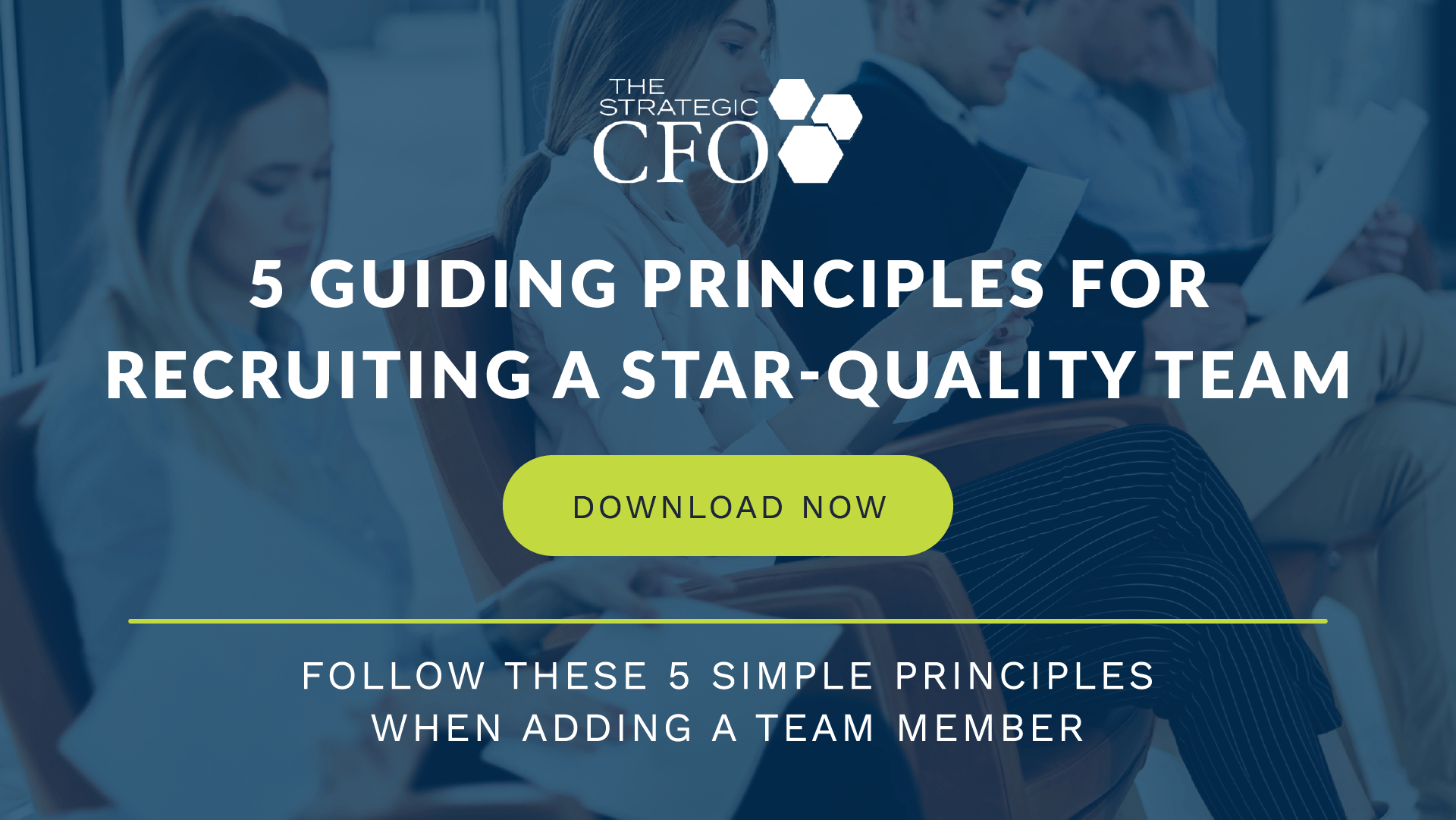Many people use Chief Financial Officer (“CFO”) and Controller interchangeably because they think it is the same position. In some companies, a Controller could be the top financial leader. But that does not mean they are a CFO or CFO-level. Before we answer the question of do you hire a Controller or a CFO, we need to understand when companies need to hire a financial leader.
 When Companies Need to Hire a Financial Leader
When Companies Need to Hire a Financial Leader
Every company needs a financial leader – depending on the stage or life/size of your company this financial leader may be a bookkeeper, accounting manager, Controller or CFO. For example, some companies over $25 million in revenue may want to consider having both a Controller and a CFO. In this blog, we will focus on the difference between a Controller and a Chief Financial Officer (CFO).
[box] Hiring? Did you know that employee turnover is the #2 reason why most businesses fail? Learn how to hire right the first time with our 5 Guiding Principles For Recruiting a Star-Quality Team! [/box]
When to Hire a Controller
You need to consider hiring a Controller once the number of transactions in your company increase and the size of your company increases to the level of needing accounting records based on Generally Accepted Accounting Principals (“GAAP”). This may be $10 million in revenue and more. Why? At that level, you are beyond the basic cash basis bookkeeping. You need accounting records that are based on GAAP and accrual basis so that you can better manage your business. Plus, you may have bank debt that requires you to present your financials based on GAAP.
Role of a Controller
Some of the duties that a Controller has include the following:
- Managing the accounts payable and accounts receivable person(s) or process
- Managing the entire accounting department
- Closing the books
- Generating financial statements
- Reconciling inter-company accounts
- Preparing monthly sales and tax returns
- In charge of journal entries and accruals
- Coordinating with the company’s tax division to prepare any schedules required for tax returns
- Coordinating with external auditors
- Providing year end data to outside CPA to prepare the income taxes
As your company grows, you should always maintain the Controller function, eventually as the company gets big enough your company will have the Controller report to the CFO. The Controller “books the past” and continually works with historical information.
When to Hire a CFO
Once your company gets to needing more than good accounting records based on the past, you may start considering hiring a CFO. Things that may require a CFO include forecasting, maintaining debt covenants, mergers and acquisitions, deeper analysis of the financial statements, managing capital structure, investors, banks, and/or taking your company public.
Many companies find themselves in a stage of growth that I refer to as “transitory” – that is, your company is transitioning from small to medium or large. In this stage, you wish you had a financial professional with great experience such as a CFO, but you cannot afford a full time CFO. That is where an Interim CFO makes a lot of sense. Now, be careful as the Interim CFO market has become a popular market where many have jumped in and they lack the true experience. The problem is that you do not need a license or degree to become a CFO, anyone can call themselves a CFO. If you are seeking an Interim CFO, then call us and we can certainly help you identify a solid Interim CFO.
Remember, a good CFO is a great manager, has good operational experience and is the strategic financial partners to the CEO.
Role of a CFO
While the role of a Controller puts together all the financials and focuses on the historical transactions, the CFO works with the historical information but uses it as a tool that enables him/her to be a strategic partner to the CEO. The CFO then projects what is going to happen, provide strategy for the CEO to implement, and improve profitability. This can include adjusting pricing, increasing efficiencies, identifying opportunities, and enabling the CEO to make calculated risks. The CFO role goes beyond being a trusted advisor. It also includes:
- Managing capital structure
- Manage risk management for the enterprise
- Acting as a figure head for decisions and taking ownership
- Usually manages IT, Human resources and tax functions
- Coaching leadership team and employees to get to best results
- Being a diplomat with third parties (banks, vendors, auditors, customers, investors etc.)
This is very much a multi-functional role within a company. It is a role that truly demands someone with not only good financial skills, but someone with excellent management skills. And as I already mentioned, a really really good CFO has very good operational experience and that person likes operations.
[box] A fish rots from the head down… Ever heard that saying? It’s absolutely true when dealing with leadership. Learn how to hire your leadership with our 5 Guiding Principles For Recruiting a Star-Quality Team! [/box]
Do You Hire a Controller or a CFO?
The big question is, do you hire a Controller or a CFO? It depends… It depends on the size of your organization. We speak to CEOs and business owners all the time, especially those under $100 million in revenue, they are not sure at what point they need a Controller and then a CFO.
Every business is unique, and I do not want to generalize. But for conversation sake, if your business is between $10 million and $25 million in revenue, then a Controller may suit you well. If you are over $50 million, then you are at the size where you actually should have both functions of Controller and a CFO. Now I left the range of $25 million to $50 million without mention on purpose. That is because it depends. It depends on your complexity, industry, number of transactions and many other things.
We have spoken to business owners of $35 million companies and determined that they can function very well with just a strong Controller. We have also met with start ups with zero revenue but funded $75 million in CAPEX by investors, well we highly recommend they hire a CFO from day one because they have big plans and complexity from day one of their operation. So every situation is really unique.
Roles are NOT Interchangeable
Many companies opt to hire a Controller when they really need a CFO. These two roles are not interchangeable. Although in the same area of expertise (accounting and finance), these two roles are different. You cannot hire a Controller and expect them to be your CFO. These are two very different functions. And it is simply a fact, not all Controllers make good CFOs. As already mentioned, a CFO has certain characteristics that many Controllers simply do not have and frankly do not want to have. Take your time to understand the different roles. You are not alone because all growing companies are facing this dilemma. But we are only a phone call away and can help you sort through this challenge and assist you in making the right decision no matter where in the world you are located.
If you are hiring either a CFO or Controller, then take the time to truly understand the difference between the two. Because the financial function is a sensitive one, it’s important to chose someone who will not only be loyal and trustworthy, but will make your team star quality. Check out our free 5 Guiding Principles for Recruiting a Star-Quality Team now! Then answer the question, do you hire a Controller or a CFO?














